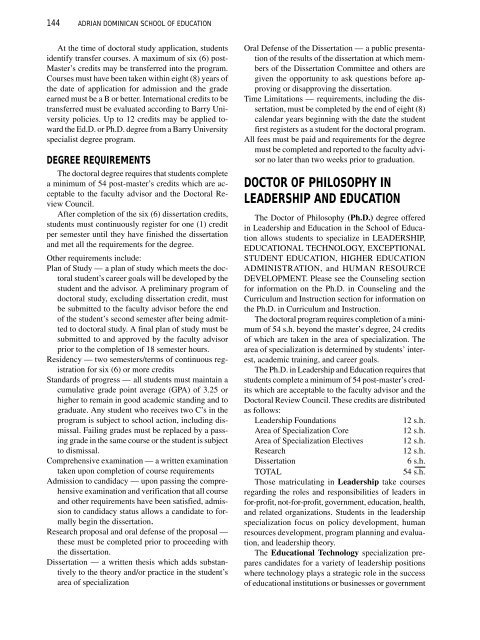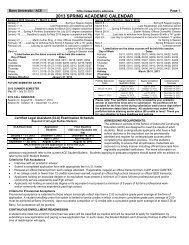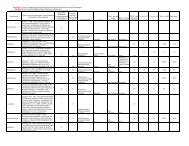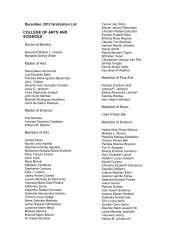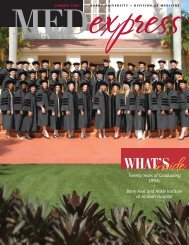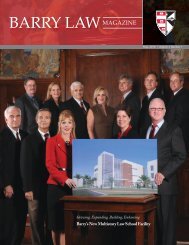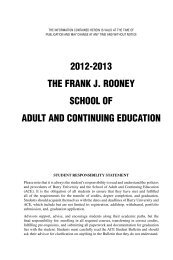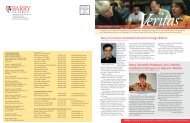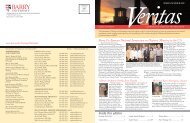2004-2005 - Barry University
2004-2005 - Barry University
2004-2005 - Barry University
You also want an ePaper? Increase the reach of your titles
YUMPU automatically turns print PDFs into web optimized ePapers that Google loves.
144 ADRIAN DOMINICAN SCHOOL OF EDUCATION<br />
At the time of doctoral study application, students<br />
identify transfer courses. A maximum of six (6) post-<br />
Master’s credits may be transferred into the program.<br />
Courses must have been taken within eight (8) years of<br />
the date of application for admission and the grade<br />
earned must be a B or better. International credits to be<br />
transferred must be evaluated according to <strong>Barry</strong> <strong>University</strong><br />
policies. Up to 12 credits may be applied toward<br />
the Ed.D. or Ph.D. degree from a <strong>Barry</strong> <strong>University</strong><br />
specialist degree program.<br />
DEGREE REQUIREMENTS<br />
The doctoral degree requires that students complete<br />
a minimum of 54 post-master’s credits which are acceptable<br />
to the faculty advisor and the Doctoral Review<br />
Council.<br />
After completion of the six (6) dissertation credits,<br />
students must continuously register for one (1) credit<br />
per semester until they have finished the dissertation<br />
and met all the requirements for the degree.<br />
Other requirements include:<br />
Plan of Study — a plan of study which meets the doctoral<br />
student’s career goals will be developed by the<br />
student and the advisor. A preliminary program of<br />
doctoral study, excluding dissertation credit, must<br />
be submitted to the faculty advisor before the end<br />
of the student’s second semester after being admitted<br />
to doctoral study. A final plan of study must be<br />
submitted to and approved by the faculty advisor<br />
prior to the completion of 18 semester hours.<br />
Residency — two semesters/terms of continuous registration<br />
for six (6) or more credits<br />
Standards of progress — all students must maintain a<br />
cumulative grade point average (GPA) of 3.25 or<br />
higher to remain in good academic standing and to<br />
graduate. Any student who receives two C’s in the<br />
program is subject to school action, including dismissal.<br />
Failing grades must be replaced by a passing<br />
grade in the same course or the student is subject<br />
to dismissal.<br />
Comprehensive examination — a written examination<br />
taken upon completion of course requirements<br />
Admission to candidacy — upon passing the comprehensive<br />
examination and verification that all course<br />
and other requirements have been satisfied, admission<br />
to candidacy status allows a candidate to formally<br />
begin the dissertation.<br />
Research proposal and oral defense of the proposal —<br />
these must be completed prior to proceeding with<br />
the dissertation.<br />
Dissertation — a written thesis which adds substantively<br />
to the theory and/or practice in the student’s<br />
area of specialization<br />
Oral Defense of the Dissertation — a public presentation<br />
of the results of the dissertation at which members<br />
of the Dissertation Committee and others are<br />
given the opportunity to ask questions before approving<br />
or disapproving the dissertation.<br />
Time Limitations — requirements, including the dissertation,<br />
must be completed by the end of eight (8)<br />
calendar years beginning with the date the student<br />
first registers as a student for the doctoral program.<br />
All fees must be paid and requirements for the degree<br />
must be completed and reported to the faculty advisor<br />
no later than two weeks prior to graduation.<br />
DOCTOR OF PHILOSOPHY IN<br />
LEADERSHIP AND EDUCATION<br />
The Doctor of Philosophy (Ph.D.) degree offered<br />
in Leadership and Education in the School of Education<br />
allows students to specialize in LEADERSHIP,<br />
EDUCATIONAL TECHNOLOGY, EXCEPTIONAL<br />
STUDENT EDUCATION, HIGHER EDUCATION<br />
ADMINISTRATION, and HUMAN RESOURCE<br />
DEVELOPMENT. Please see the Counseling section<br />
for information on the Ph.D. in Counseling and the<br />
Curriculum and Instruction section for information on<br />
the Ph.D. in Curriculum and Instruction.<br />
The doctoral program requires completion of a minimum<br />
of 54 s.h. beyond the master’s degree, 24 credits<br />
of which are taken in the area of specialization. The<br />
area of specialization is determined by students’ interest,<br />
academic training, and career goals.<br />
The Ph.D. in Leadership and Education requires that<br />
students complete a minimum of 54 post-master’s credits<br />
which are acceptable to the faculty advisor and the<br />
Doctoral Review Council. These credits are distributed<br />
as follows:<br />
Leadership Foundations 12 s.h.<br />
Area of Specialization Core 12 s.h.<br />
Area of Specialization Electives 12 s.h.<br />
Research 12 s.h.<br />
Dissertation 6 s.h.<br />
TOTAL 54 s.h.<br />
Those matriculating in Leadership take courses<br />
regarding the roles and responsibilities of leaders in<br />
for-profit, not-for-profit, government, education, health,<br />
and related organizations. Students in the leadership<br />
specialization focus on policy development, human<br />
resources development, program planning and evaluation,<br />
and leadership theory.<br />
The Educational Technology specialization prepares<br />
candidates for a variety of leadership positions<br />
where technology plays a strategic role in the success<br />
of educational institutions or businesses or government


